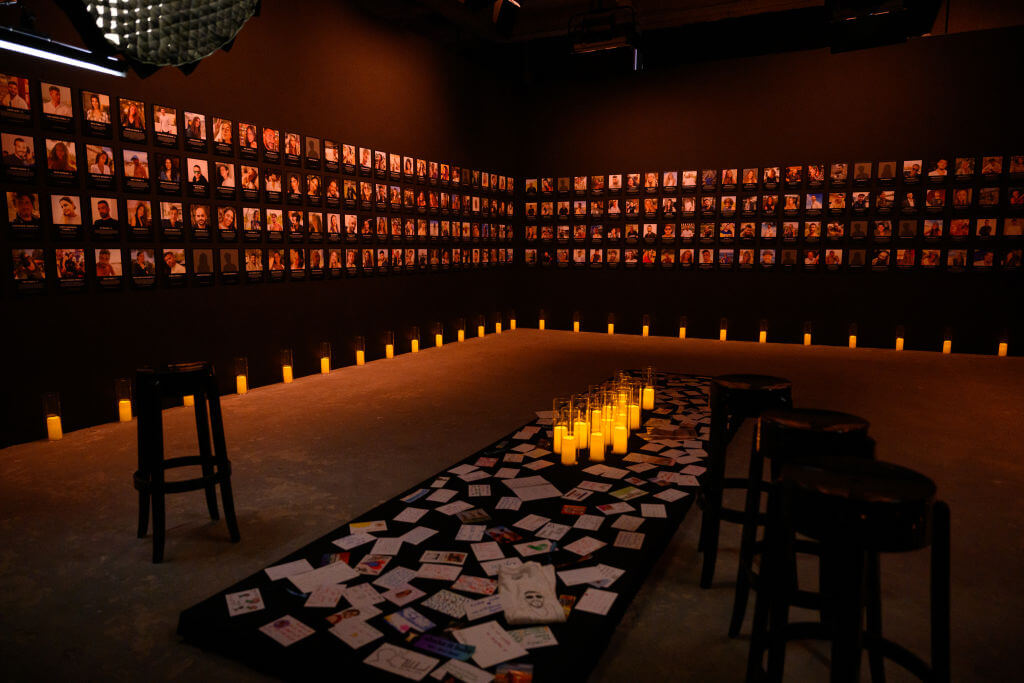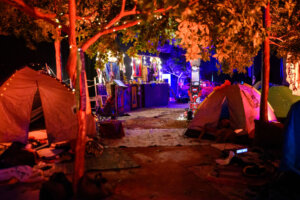Is it too soon for an exhibit about the massacre at the Nova Music Festival, or is it just the right time?
An exhibition about the terrorist attack on Oct. 7 comes from Tel Aviv to New York City

Subtitled “6:29 a.m.: The Moment Music Stood Still,” the exhibit is open to the public until June 16. Photo by Alexi Rosenfeld/Getty Images for The Nova Music Festival Exhibition
It’s hard to imagine a curated version of all this sadness.
When I first heard about The Nova Music Festival Exhibition, I struggled to think about what such an installation might look like. Billed as an “in-depth remembrance” of Hamas’ Oct. 7 attack in Southern Israel, I was skeptical about how to remember an event that doesn’t feel like it’s part of the past. Can objects just seven months old even be considered artifacts?
The exhibit, currently showing on Wall Street, commemorates the massacre at the Nova Music Festival, which was held 3.1 miles from Gaza on the Jewish holiday of Simchat Torah. An estimated 44 festivalgoers were kidnapped and at least 360 were killed, accounting for nearly a third of the roughly 1,200 murdered in Israel that day. The exhibit does not include information about the attacks on the nearby kibbutzim or Hamas’ accompanying rocket barrage, nor does it address the ruthless war that has raged on since then.
As the festival’s trance music played, I scrolled through final WhatsApp messages sent to loved ones and touched sleeping bags still unzipped and unfurled. I opened the bullet-shot doors of porta-potties and wondered if there was any chance somebody could have survived in there. I crept around the makeshift festival stage to view incinerated cars which were arranged upside down and sideways as they were found. At tables labeled “Lost and Found,” I combed through house keys and glasses, and overflowing piles of shoes reminiscent of exhibits I’d visited about the Holocaust.
After you enter through airport-level security (they confiscated my mini-bottle of hand sanitizer), the first thing you see is a short video clip of the festival prior to the attack: the happiness and dancing, the youthfulness and innocence.
From there, it’s chaos. Entering the recreated festival grounds, you lose track of where to look. At every corner of the room, screens are playing graphic videos and audio: young couples saying goodbye to each other and to their parents; Hamas militants on the phone with each other; family members who lost their spouses and children; rescuers vividly detailing the sights and smells of the scenes they searched through.

A group of survivors, including Ofir Amir, are on the scene, and they chat with museumgoers throughout. Amir, whose wife was nine months pregnant at the time but not at the festival, was shot in both of his legs. The final rooms feature a dedicated memorial for those killed, and a table where viewers can write notes on paper or on stones, typical of the Jewish mourning custom. By the exit doors, the last thing viewers see is a neon sign promising, “We will dance again.”
Subtitled “6:29 a.m.: The Moment Music Stood Still,” the exhibit opened in Tel Aviv where it ran for 10 weeks, and is now in New York until June 16. The installation’s founders include Israeli survivors as well as U.S. partners like music executive Scooter Braun and entrepreneur Joe Teplow. The UJA-Federation of New York donated more than $800,000 for its construction.
Braun, in particular, has a history of commemorating music’s most tragic moments. As Ariana Grande’s manager during the terror attack at her concert in Manchester, England, which killed 22 and injured more than 100 attendees, he raised more than $12 million and organized a benefit concert.
“I think the events of Nova are not only being forgotten, they’re being ignored,” Braun told CBS Sunday Morning, comparing the divisive aftermath of the Nova festival with how, in his view, the world came together after Manchester.
In his Instagram post announcing his partnership with Nova’s founders, Braun wrote, “I knew they deserved better than what the world was showing them. People need to understand it could have been any of us, at any festival. Music must remain a safe place.”
The museum’s interactive and realistic design effectively imparts that understanding. It reminds you of what music feels like — the sense of community among strangers, the brief and hopeful moments when the world feels like an OK place — and then it breaks your heart. Among the great tragedies is the one which reminds us that the wide-eyed Israelis who attended the trance music festival would have been among the most likely to criticize their government now leading the war.
With each deadly moment, it’s challenging to hold onto all of the pieces of this war at once. 6:29 a.m. is an appropriate time to start.
A message from our Publisher & CEO Rachel Fishman Feddersen

I hope you appreciated this article. Before you go, I’d like to ask you to please support the Forward’s award-winning, nonprofit journalism so that we can be prepared for whatever news 2025 brings.
At a time when other newsrooms are closing or cutting back, the Forward has removed its paywall and invested additional resources to report on the ground from Israel and around the U.S. on the impact of the war, rising antisemitism and polarized discourse.
Readers like you make it all possible. Support our work by becoming a Forward Member and connect with our journalism and your community.
— Rachel Fishman Feddersen, Publisher and CEO





























